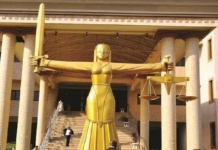
Deadly attacks and deepening political unrest are threatening Kenya’s reputation as an island of stability in East Africa
Almost 250 people have died in attacks across the country since September, when al-Qaeda-linked militants raided the Westgate Mall in the capital, Nairobi, and killed 67 people. Ethnic tensions are also stirring memories of violence that followed disputed elections almost seven years ago, with the opposition organizing a series of rallies over the past month.
The slaughter of at least 22 people at villages on Kenya’s coast last weekend highlighted the crisis. While the country serves as the East African hub of companies such as Google Inc. (GOOGL) and sold its debut Eurobond last month, a further deterioration in Kenya’s security situation may undermine investor confidence.
“The security issues now from terrorism, to community clashes over resources, general crime in the country and political tension are unprecedented and government capacity to deal with it is stretched,” Robert Bunyi, managing director of Nairobi-based Mavuno Capital, said by phone yesterday.
The World Bank last month cited worsening insecurity as a key reason for lowering its annual economic growth forecast to 4.7 percent this year and next, from as much as 5.2 percent. A further deterioration in the safety situation may undermine investor confidence, curb expansion and increase funding costs, exerting pressure on Kenya’s B1 credit rating, Moody’s Investors Service said on June 17.
‘Negative’ Perception
“We have not seen anyone halt major investment to Kenya yet because of insecurity, but the perception is negative,” Yvonne Mhango, a Johannesburg-based economist at Renaissance Capital said by phone yesterday. “The concern mainly is whether the government is doing anything to stop or reduce these attacks.”
The shilling traded at a 2 1/2-year low of 88.20 per dollar yesterday, bringing its losses so for this year to 1.9 percent, according to data compiled by Bloomberg. The currency was little changed at 87.90 per dollar by 1:09 p.m. in Nairobi.
Foreign governments including the U.K. and U.S. have warned their nationals to avoid travel to the port city of Mombasa, sections of the coast that are popular with tourists and parts of Nairobi, which hosts the regional headquarters of companies including International Business Machines Corp. (IBM), Toyota Corp. (7203) and the United Nations.
Tourism, the country’s biggest foreign-exchange earner after tea, has been dented by the threats, with arrivals of holidaymakers falling 18 percent to 1.4 million last year. Kenya Airways Ltd. partly blamed the Westgate raid and foreign travel warnings for posting a second-half loss through March.
Market Resilience
“The resilience of the markets has been impressive, however we still remain solidly behind the curve on national security,” Aly-Khan Satchu, chief executive officer of Nairobi-based Rich Management Ltd., an adviser to companies and wealthy individuals, said yesterday in a phone interview. “Insecurity has created high risk levels in the country.”
Kenya’s diverse economy helps it stand out from its peers to investors, Razia Khan, head of African research at Standard Chartered Plc, said yesterday by phone from London.
Agriculture accounts for a fifth of gross domestic product, trade represents 10 percent of output and manufacturing as well as communication and transport 9 percent each, according to 2013 data from the statistics agency. Kenya envisages producing its first oil as early as 2016 as Tullow Oil Plc (TLW) and its partner Africa Oil Corp. (AOI) develop crude finds.
Debt Sale
Confidence in Kenya’s economy was demonstrated by the international appetite for the country’s first sale last month of sovereign debt that was more than five times oversubscribed, Treasury Secretary Henry Rotich said on June 25. The highest demand came from U.S. investors followed by the U.K., he said.
Kenya sold $500 million of five-year Eurobonds carrying a coupon of 5.875 percent and $1.5 billion of 10-year bonds at 6.875 percent as investors ignored the security concerns.
Al-Shabaab claimed responsibility for the Westgate attack, as well as the massacre of 60 people in and around Mpeketoni in coastal Lamu county last month and the nearby raid on July 5 that left 22 people dead. President Uhuru Kenyatta’s government said political and land grievances motivated the coastal assaults over the past month.
Al-Shabaab has said it would attack Kenya in retaliation for the country’s deployment of troops in Somaila, where the militia is trying to overthrow the government and establish Shariah, or Islamic law. Kenyatta has vowed to keep the troops in place until the threat of al-Shabaab is thwarted.
Opposition Rally
Thousands of former Prime Minister Raila Odinga’s supporters held a rally in Nairobi yesterday to demand the government address worsening insecurity, the rising cost of living, corruption and for an overhaul of the national electoral body.
Odinga’s Coalition for Reforms and Democracy began a new campaign known as Okoa Kenya, or Save Kenya, after Kenyatta rejected their request for a national dialog to discuss their demands. The campaign will include collecting 1 million signatures to initiate a referendum on “critical challenges” facing the nation.
Political allegiances in Kenya are determined along ethnic lines, which has led to violence in the past.
Allegations of vote-rigging by Odinga, an ethnic Luo, after he lost his campaign for the presidency in December 2007 led to two months of ethnic and political clashes that left more than 1,100 people dead and displaced another 350,000. Kenyatta, a member of the Kikuyu group, is facing crimes against humanity charges at the International Criminal Court for his role in organizing the fighting, a charge he denies.
“Confidence will remain for as long as nothing happens that will strongly affect the macroeconomic performance of Kenya,” Khan said. “That does not mean investor confidence will continue to be resilient though. If we have big incidents at the scale of Westgate, investors could become jittery.” Reporters: David Malingha Doya and Sarah McGregor in Nairobi.








